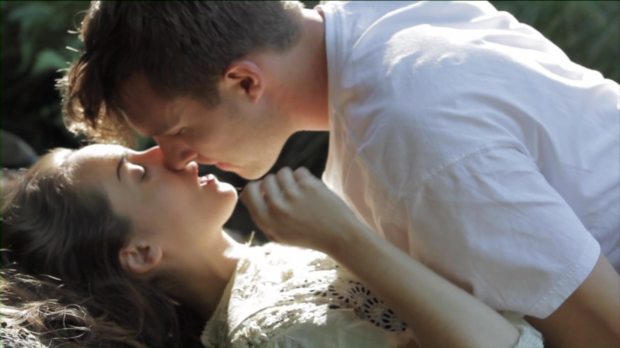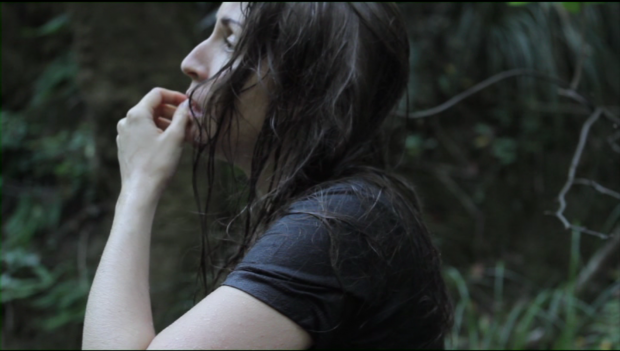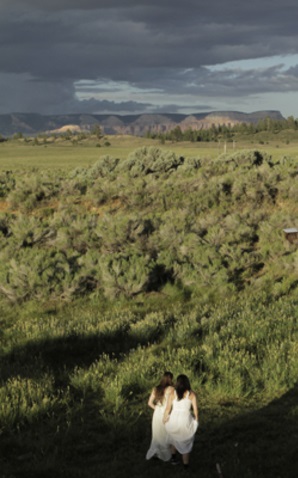Attention fans of dark, surreal drama, there’s a new voice in town and here’s hoping she sticks around. When I came to her new film Butter on the Latch, I didn’t recognize Josephine Decker’s name but a little research revealed I had seen her before, not just in films like Joe Swanberg’s Uncle Kent and the Scooby-Doo inspired thriller Saturday Morning Massacre, but in censored photos recounting her notorious nude stunt at an MOMA exhibit for performance artist Marina Abramovic back in 2010.
One can mention all of this and then leave it at the door, because what matters here is the work itself, a bold, unsettling film that can feel reckless one moment, and then methodical and accomplished the next. It’s the calling card of a new voice in a sub-genre that has spent far too much of its time worshiping at the altar of David Lynch and not enough exploring the dark-side of our own natural and social histories. Weaving a dreamlike web of psychological and mythological connections, Latch asserts itself from the very first scene, causing us to question not just the mental stability of its protagonist but the very nature of the world she lives in.

The universe unfolding onscreen is unique in the way it blends a very specific, realistic microcosm—the culture and community surrounding a Balkan music festival in Mendicino, California—with the imaginary dread of Bulgarian folklore and the implied danger of an unraveling psyche. When we meet Sarah (Sarah Small) she’s landed in an extremely strange situation that questions the film’s chronology and sends her packing to the wilderness, where she hooks up with old pal Isolde (Phillippa Lamb) for the festival.
Much of Decker’s brief running time is afforded to the event itself, complete with numerous songs that either slither across the soundtrack or manifest as visual performances, a few of them potentially only happening in the mind’s eye. In between this folksy miasma, we glimpse Sarah and Isolde interacting in the cracks of the film. Their playful, smoldering flirtation—that’s what it must look like to Sarah at least—gives way to other emotions when one of them starts a fling with Steph (Charlie Hewson), a male camper.

The tone abruptly shifts halfway through, and a pivotal event occurs that unleashes the hypnotic and trippy side of Butter on the Latch, with Sarah confronting female spirits and fantastical creatures lurking under her own identity. Throughout, Decker keeps the film focused and achingly specific in its setting while suggesting the magical and nightmarish–and possibly the demonic –present in the wild and haunting beauty of the wilderness. Sensual, nighttime campfires and steamy dalliances near quiet lakes adopt a hazy insubstantial sheen when viewed through Ashley Connor’s lens.
The rituals and customs tied to the Balkan folk songs add an intriguing element of the ancient and universal to the psychodrama that’s coursing through Sarah and Isolde. The sexual saunters up to the mystical and the eroticism towards film’s end is effectively contrasted against the story the friends tell early on, about dragons that will entwine themselves in a girl’s hair and carry her off to burn in the night sky. The character development between Sarah and Isolde is minimal at best, but the actors are so integrated into Decker’s fantasia that who they are isn’t as important as what they bear witness to.
Films that reconstitute reality to reflect and inform the mental agency of their characters are a pretty common occurrence, especially in the genre of fantasy and horror, and more often than not they rely upon a fixed concrete point that the audience can navigate around. That’s not so with Butter on the Latch, which introduces us to its world of songs and folklore without any explanation or contextual understanding, and bounces us through the perspective of its characters without revealing to us anything more than they themselves seem to know. Strangely, the narrative becomes more substantial as the imagery and structure themselves become fluid, Sarah’s mind behaving like a dog that’s been leashed to a pole and has circled until it’s become hopelessly entangled.
Decker has made a compelling feature that revels in its own rough-hewn nature, and although it’s not successful or polished in everything it tries to do, the result is honestly disorienting and memorable. The director’s finest accomplishment is the bridge she crafts between three different experiences; that feeling of restless displacement that follows a vivid dream, that disorientation that comes with a sudden perception shift, and the catharsis of channeling those feelings into a work of art—be it a song, a story, or a film– that puts a mask back on the unknown and, ironically, lets us see its face.
Butter on the Latch is now screening at the Maryland Film Festival.

